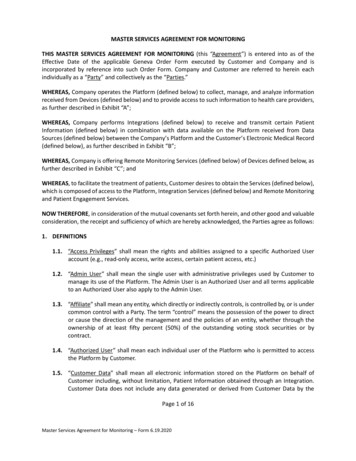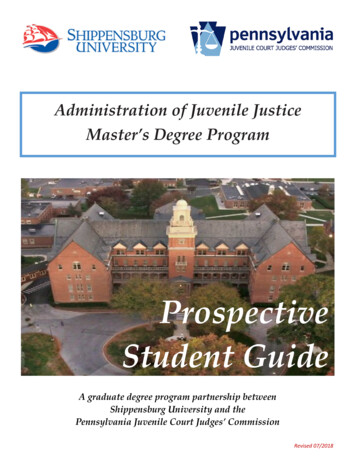
Transcription
Administration of Juvenile JusticeMaster’s Degree ProgramProspectiveStudent GuideA graduate degree program partnership betweenShippensburg University and thePennsylvania Juvenile Court Judges’ CommissionRevised 07/20181
Dear Prospective Student,Welcome to the Master’s Program in Administration of Juvenile Justice at ShippensburgUniversity of Pennsylvania. If you are interested in pursuing a Master’s degree in the field ofJuvenile Justice, this guide has been prepared expressly for you. While we have attempted toaddress the most frequently asked questions regarding our program, we encourage you tocontact our Graduate Education Coordinators, Mrs. Sonya Stokes at systokes@ship.edu orDr. Melissa L. Ricketts at mlricketts@ship.edu, with any remaining questions.We look forward to hearing from you!TABLE OF CONTENTSProgram Overview . 3Program History . 3Program Mission Statement . 3Educational Objectives . 4Required Core Courses . 5Administration of Juvenile Justice Capstone Courses . 5Elective Courses . 5JCJC Course Delivery Information . 6Admission Information . 6Application Procedures. 6Application Timeline . 6Program Eligibility. 7Program Costs . 7Conditions of Admission . 7Interview . 8Orientation . 8Dr. Anthony F. Ceddia Award. 82
PROGRAM OVERVIEWPROGRAM HISTORYEstablished in 1982, the Center for Juvenile Justice Training and Research(CJJT&R) at Shippensburg University is regarded as the state andnationally recognized training, education, and research center forjuvenile justice in Pennsylvania. The CJJT&R wanted to supportgraduate work for professionals in the field of juvenile justice by offeringa weekend master’s program taught by criminal justice faculty atShippensburg. Since its inception in 1982, the Graduate EducationProgram in Administration of Criminal Justice has significantlycontributed to the improvement of services to delinquent children inPennsylvania. By : sponsoring tuition scholarships the costs of the Graduate Education Program, the JuvenileCourt Judges’ Commission provides a tool to help county juvenile probation departments recruit and retainquality probation officers, increase their level of expertise and effectiveness, and create a professional climateconducive to creativity and research. The program also created a networking system in which the juvenileprobation officers meet colleagues from all over the state. In May 2016, admissions to the GraduateEducation Program were suspended pending a comprehensive review of this program. The goals of thisendeavor, developed by the Pennsylvania Juvenile Court Judges’ Commission and the Department ofCriminal Justice at Shippensburg University, were to: Create a graduate education program that aligns with the Academy of Criminal Justice Sciences(ACJS) certification standards. Create a program that provides a focus on juvenile justice with practical applications for juvenileprobation officers throughout the Commonwealth. Deliver a program taught by committed faculty with working knowledge of juvenile justice bestpractices.Changing the name of the degree from an MS in Administration of Justice (Juvenile Justice Concentration) toan MS in Administration of Juvenile Justice reflects the overall focus of the program which continues to servejuvenile justice practitioners. As a result, the curriculum was updated to reflect the current practices in thefield of juvenile justice resulting in a more focused Juvenile Justice curriculum.PROGRAM MISSION STATEMENTThe Master of Science in Administration of Juvenile Justice (MAJJ) Program at Shippensburg Universityprovides a quality graduate program that promotes advanced inquiry and application of new knowledge.One of the core values of Shippensburg University is to inspire and guide students to become successfulleaders in their professions and their communities. The program aims to serve the juvenile justiceeducational and research needs in the Commonwealth of Pennsylvania. The emphasis of the program isscientific, because it is assumed that graduates will be better qualified to participate in the profession if theyare prepared as research-oriented students of juvenile crime and delinquency.Program faculty participate in research and service activities that benefit criminal and juvenile justice andsocial service agencies locally, statewide, and nationally. The faculty’s involvement in research andcommunity affairs enhances the classroom experience, as faculty members are able to engage students indiscussions of current dilemmas and controversies. In most of our coursework, juvenile crime anddelinquency are viewed as social phenomena and are analyzed with methodologies developed in the socialand behavioral sciences.3
EDUCATIONAL OBJECTIVESThe program's major strengths are its applied perspective and strongemphasis on theory, policy, research, and analysis. Philosophy,format, and implementation stress the practical application of ahigher level of knowledge, skills, and strategies.The curriculum is guided by the following assessment objectiveswhich are evaluated on a yearly basis:KEY PROGRAMFEATURESOBJECTIVE 1: Comprehensive Knowledge of Juvenile Justice:Students will understand more readily the operations of boththe juvenile and criminal justice system and the many issues(both theoretical and practical) that confront theadministration of justice in a democratic society. Nationally recognizedprogram, taught byhighly qualified andexperienced faculty. Free tuition and lodgingprovided by theJuvenile Court Judges’Commission. A hybrid 33-creditprogram. Summer courseworkfully online and 3 faceto-face weekendsessions during the falland spring semesters. A cohort-basedprogram designed toenhance professionalnetworking across theCommonwealth. Practical coursesdesigned for juvenilejustice professionalswith an emphasis onevidence-basedpractices.OBJECTIVE 2: Critical Analysis:Students will understand more readily how to interpret,analyze, and evaluate issues of importance in the field ofjuvenile justice.OBJECTIVE 3: Communication:Students will be able to more readily express their knowledgeand critical analysis ability through both written work andoral presentation.OBJECTIVE 4: Exposure to Human and Cultural Diversity:Faculty will expose students to the issues of diversity in thejuvenile justice system and provide opportunities forstudents to participate in experiences that promote diversity.OBJECTIVE 5: Exposure to Ethical Problem Solving:Faculty will expose students to the nature of ethics in generaland the role of normative ethics in the juvenile justice systemand provide opportunities for students to participate injuvenile justice-related situations (hypothetical or actual) thatdeal with ethical issues.OBJECTIVE 6: Exposure to Technology:Faculty will expose students to the use of technology in thefield of criminal justice in general and provide opportunitiesfor students to participate in juvenile justice related situationsthat deal with technological issues.4
STUDENT LEARNING OUTCOMESThe program is competency-based; its intent is todevelop in students a set of competencies jointlyarrived at by the Shippensburg University CriminalJustice Department and the JCJC. Education forexcellence in criminal and juvenile justice practice isthe guiding mission of the Department of CriminalJustice at Shippensburg University. The faculty whoteach in the JCJC program are committed to providinghigh quality education that will prepare students toprovide practitioner-based services that are ethical,impartial, and effective in a rapidly changing andincreasingly diverse society.Upon completion of the program, student learnersshould possess: An advanced understanding of administrativeprinciples and practices found in criminal andjuvenile justice agencies.PROGRAM REQUIREMENTS FORGRADUATION (33 credits)Criminal justice program information and coursedescriptions are in the graduate student catalog.Graduate students are expected to maintain asatisfactory academic standard, which requires acumulative QPA of 3.0 (B) or better in your totalprogram courses. If it drops below 3.0, or you earn aC grade in a graduate course, you will be placed onacademic probation.REQUIRED CORE COURSES (21 Credit Hours)AJJ 501: Seminar in Juvenile Justice & DelinquencyAJJ 502: Advanced Criminological TheoryAJJ 503: Leadership in Juvenile JusticeAJJ 504: Advanced Research MethodsAJJ 505: Quantitative AnalysisAJJ 506: Strategic Planning, Budgeting & Finance Advanced knowledge of theories relating to crime AJJ 507: Seminar in Policy Analysiscausation and criminality.ADMINISTRATION OF JUVENILE JUSTICE In-depth knowledge of the interdisciplinarynature of the criminal and juvenile justice system. CAPSTONE COURSES (6 Credit Hours)AJJ 551: Practicum IKnowledge of contemporary technologies used tomanage juvenile justice information.AJJ 552: Practicum IISkills that enable the learner to conduct andevaluate criminal and juvenile justice-relatedresearch.AJJ 520: Advanced Studies in PolicingAdvanced problem-solving skills that enable thelearner to identify, analyze, and solve juvenilejustice operational problems that affect thedelivery of criminal justice-related services.AJJ 523: Mental Health & the Administration of JusticeAdvanced reading, writing, and verbalcommunication skills.ELECTIVE COURSES (6 Credit Hours)AJJ 521: Seminar in VictimologyAJJ 522: Seminar in Social JusticeAJJ 524: Anatomy of ViolenceAJJ 525: Intimate Partner & Family ViolenceAJJ 540: Selected TopicsAJJ 541: Selected TopicsAJJ 550: Independent Study5
JCJC COURSE DELIVERY INFORMATIONFall 1Spring 1Summer 1ASummer 1BFall 2Spring 2AJJ 501AJJ 503AJJ 551AJJ—Elective 2*AJJ 505AJJ 506AJJ 502AJJ 504AJJ—Elective 1*AJJ 552AJJ 507* indicates online classADMISSION INFORMATIONAPPLICATION PROCEDURESInterested applicants must follow application procedures for both the Center for Juvenile Justice Training andResearch (CJJT&R) and Shippensburg University. The application process is facilitated online throughShippensburg University. For your reference, below is the list of required materials: A completed Graduate Education Program Application (see JCJC Website: www.jcjc.pa.gov orAdmissions Application for the Shippensburg University, School of Graduate Studies). A letter of Interest for Endorsement and Admission to the Administration of Juvenile Justice JCJCGraduate Education Program and the Shippensburg University School of Graduate Studies. This lettershould address the following issues: a) why you are a strong candidate for endorsement; b) any reasonswhy you may still be a strong candidate despite having an undergraduate GPA below 2.75/4.00; c)complete description of juvenile justice work experience; and, d) how you expect to use the graduateeducation experience to improve practices in the county from which application is made. The Recommendation Form is to be completed and signed by the Chief Juvenile Probation Officer in yourcounty. (Note: Applicants who are employed at county-administered detention facilities will also need aletter of endorsement from both the detention center administrator and the county's Juvenile CourtAdministrative Judge). A copy of your résumé. A copy of your undergraduate and graduate (if applicable) transcripts. Official transcripts are required. A copy of your official GRE/MAT scores (applicable only if your undergraduate GPA is below 2.75/4.00).APPLICATION TIMELINESince there are a limited number of positions available for each class, admission is on a competitive basis.The timeline for enrollment and the application process is as follows:March 1stMayApplication deadline each year to begin in the fallsemester. Interested applicants must followapplication procedures for both the CJJT&R andShippensburg University as outlined above.JCJC Endorsement; the Commission membersendorse candidates at the May meeting. Prospectivestudents receive Endorsement letters from CJJT&Rand instructions for registering for classes.Second week in AprilSeptemberJCJC Endorsement Interviews at Shippensburg.Administration of Juvenile Justice JCJC GraduateEducation Program Orientation and classes begin.6
ADMISSION INFORMATIONPROGRAM ELIGIBILITYThe program is available to full-time county juvenile probation officers inPennsylvania who graduated from an accredited college or university withat least 18 credits in the behavioral or social sciences, and who have been,or will be, employed in the Juvenile Justice System for at least two yearsprior to admission. As space allows, county juvenile detention staff (andother juvenile justice professionals) may be admitted to the program uponthe recommendation of the Juvenile Court Administrative Judge.PROGRAM FACTS The JCJC weekendMaster’s Program inAdministration of Justicebegan in 1982. Through the JCJCsponsored Master’sProgram inAdministration of Justice,Shippensburg Universityhas graduated over 600juvenile court employees. Virtually each of theCommonwealth’s 67counties has a juvenileprobation officer with aleadership model of aChief, a Deputy Chief, anda Supervisor. Out ofthose 200 leaderscurrently employed,approximately 80% ofthose have master’sdegrees obtained throughShippensburg’s graduateeducation program.PROGRAM COSTSThe JCJC pays all tuition costs and lodging. Students are responsible for allother costs, including books, University fees, and travel expenses, whichtotal approximately 800 per year.CONDITIONS OF ADMISSIONStudents agree to attend the program continuously for two academicyears, and to maintain their current employment status for the duration ofthe program and for at least two years after graduation. Students who failto meet these conditions will be required to reimburse the Commonwealthof Pennsylvania for all, or a portion of, tuition and boarding costs paid ontheir behalf.There are two primary requirements for admission to the GraduateEducation Program: Acceptance into the Shippensburg University School of GraduateStudies. Endorsement by the Juvenile Court Judges’ Commission. The weekend Master’sApplicants must meet all requirements of Shippensburg University’sProgram was revised inSchool of Graduate Studies as defined in the current Graduate Catalog.2017 to an AdministrationApplicants should have a baccalaureate degree in criminal justice, or aof Juvenile Justice Degree.closely-related social science field from a regionally accredited college oruniversity with a minimum grade point average of 2.75/4.00. Applicantswho do not meet the minimum grade point average requirement mustsuccessfully take either the Graduate Record Examination (GRE) or Miller Analogies Test (MAT) and submittheir scores as part of their application. The standard for successfully passing the GRE or MAT is at or abovethe 50th percentile.The Department of Criminal Justice recommends the GRE as it reflects a familiar testing format that issimilar to the SAT. The GRE assesses student strengths in verbal, quantitative, and analytical areas,whereas the MAT only assesses student strengths in the area of verbal reasoning. With the Administration ofJuvenile Justice program focus on academic research requiring strong verbal, quantitative, and analyticalskills, the GRE provides for a better assessment of a student’s potential for success. Both the GRE and MATrequire academic preparation to successfully complete. Upon request, assistance with GRE/MAT preparationmay be available from the University.7
ADMISSION INFORMATIONINTERVIEWAs indicated above, admission to the program is a competitive process. As such, there is an interviewcomponent which follows the submission of all completed application materials (which ensures that alladmission requirements have been met). This interview is conducted by members of the JCJC/CJJT&R,faculty from the Department of Criminal Justice, and representatives from county Juvenile Probationdepartments. The interview process is the final stage in the selection of candidates for proposedendorsement.The interview process is a requirement for admission to the program and is highly influential in the selectionprocess. Candidates are given the opportunity to explain why they would be a strong student in the program,and how their education can benefit their county (and/or) the PA Juvenile Justice System.ORIENTATIONPrior to starting classes, each student is expected to attend the JCJC Graduate Education Program Orientation.The one-day workshop provides members of each incoming cohort with important information necessary tobe successful as a graduate student at Shippensburg University.DR. ANTHONY F. CEDDIA AWARDEach year, the members of the Criminal Justice Faculty who teach in the program select an exceptionalstudent from that year’s graduating class to receive the Dr. Anthony F. Ceddia Award for OutstandingScholarship in Juvenile Justice. The criteria for the award are academic excellence, leadership, andcommitment to the juvenile justice profession as demonstrated throughout the program. All three criteria aregiven serious consideration by the faculty when selecting the award recipient.Additional information can be obtained by contacting:Mrs. Sonya StokesDirector of Professional DevelopmentJuvenile Court Judges’ CommissionCenter for Juvenile Justice Training & ResearchShippensburg University216 Horton Hall1871 Old Main DriveShippensburg, PA 17257717.477.1294systokes@ship.eduDr. Melissa L. Ricketts, Ph.D.JCJC Graduate Program CoordinatorDepartment of Criminal JusticeShippensburg University311 Shippen HallShippensbu
JCJC Endorsement Interviews at Shippensburg. May JCJC Endorsement the Commission members endorse candidates at the May meeting. Prospective students receive Endorsement letters from CJJT&R and instructions for registering for classes. September Administration of Juvenile Justice JCJC Graduate Education Program Orientation and classes begin.
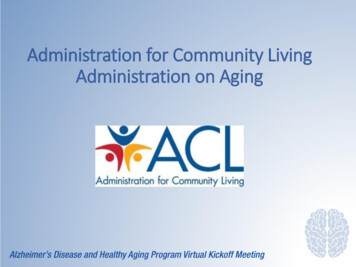
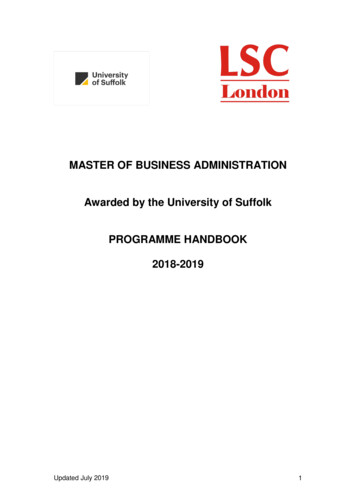



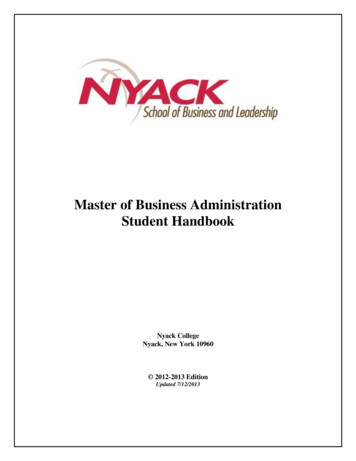

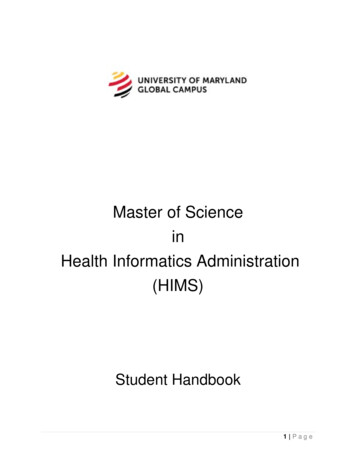
![GLOBAL MASTER IN BUSINESS ADMINISTRATION [GMBA]](/img/9/cat-p-192-i.jpg)


